
Australian doctors need transparent, publicly scrutinised and accessible COVID-19 triage policies to enable them to honour their legal obligations before making sometimes “impossible” decisions in cases where ICUs and hospitals are overwhelmed with critically ill patients.
- If hospitals are overwhelmed with critically ill patients in a pandemic or natural disaster doctors must make “impossible” decisions about which patients have access to life-sustaining treatment
- A number of potential areas of legal risk in response to pandemic triage decisions exist
- To manage this risk, Australian doctors need triage protocols to guide and support their decisions
QUT Dr Eliana Close, from the Australian Centre for Health Law Research in QUT Faculty of Business and Law, said deciding between patients who should get life-sustaining treatment when resources were outstripped by demand was distressing for doctors.
“Compounding this is the potential for legal liability and many of the legal issues that arise in pandemic triage are untested and may involve many areas of law,” Dr Close said.
“When allocating scarce resources, clinicians need standards to support their decisions which have been subject to public consultation and rigorous legal review.
“Even though health authorities have wide discretion in making resource allocation decisions which are generally respected by the courts, in some circumstances, clinicians and institutions may be found liable and decisions may be challenged on public law grounds.”
Dr Close said some countries had enacted immunity or indemnity laws to protect clinicians making COVID-19 triage decisions.

“In Australia, no such laws exist and it does not appear that they have been considered." she said.
“Although every Australian state and territory has disaster management plans, publicly available COVID-19 triage protocols are lacking.
“Queensland Health released an extensive ethical framework for COVID-19 in April 2020, which has since been removed.
“New South Wales is the only state to mention a triage guideline, but its COVID-19 framework does not link to it.
“Western Australia has a four-page ethical framework but no publicly accessible protocol.
“While a triage policy could establish obligations in addition to the law, the law may also impose more onerous obligations than a policy, in which case the legal standard would prevail.”

Dr Close said potential areas of legal risk in response to pandemic triage decisions included:
Civil law - Withholding or withdrawing beneficial life-sustaining treatment from one patient for the benefit of another with a better prognosis could amount to a breach of the duty of care and liability in negligence in some circumstances.This would be subject to the peer professional practice defence for clinicians and the resource allocation defence in the case of hospitals.
Criminal law - withdrawing a ventilator from one patient who is stable to provide it to another with a greater chance of survival could lead to criminal charges if the first patient dies as a result.
Charges would depend on the prosecutorial discretion and jurisdiction-specific defences such as necessity.
Commonwealth and state antidiscrimination laws - A triage protocol could violate state and territory antidiscrimination legislation if the decision was made on the basis of a protected attribute such as age, disability or race (although specific protections may apply under the legislation for decision makers).
Guardianship legislation – a decision to withhold or withdraw life-sustaining treatment from a patient who lacks capacity to provide it to someone with a better prognosis may violate state or territory guardianship legislation, which requires health care decisions to be made in a person’s best interests.
Also, some triage decisions may be precluded in Queensland, where guardianship legislation makes it illegal to withhold or withdraw life-sustaining treatment from patients who lack capacity without the consent of an appropriate decision maker, even if the treatment would be futile.
Dr Close said if the Australian health system was overwhelmed with COVID-19 cases (or other natural disasters or public health emergencies) specific triage protocols would be of critical importance for clinicians.
“A triage protocol, with its greater degree of specificity, would generally provide more legal protection than ethical guidelines.
“Without a triage protocol during a resource shortage it could be risky to not provide beneficial life-sustaining treatment because it would be harder to use the professional practice defence in a negligence action.
“An institution, too, could be at risk of claims for not issuing a COVID-19 triage policy.”
Dr Close said that ethically legitimate triage decisions required a fair process based on relevant criteria, a publicly accessible rationale, and (to the extent possible given the urgency of decisions) mechanisms for appeal, review and enforcement.
“Transparency is also important from a legal perspective because it subjects triage policies to public scrutiny before public health emergencies reach crisis levels.
“While internal legal advice on triage policies can be sought, experience in overseas authorities show that public scrutiny, consultation and litigation help test the policy’s legal boundaries."
Transparent triage policies during the COVID-19 pandemic: a critical part of medico-legal risk management for clinicians was published in the Medical Journal of Australia.
Dr Close and colleagues have also published a detailed analysis of the legal position, Legal Challenges to ICU Triage Decisions in the COVID-19 Pandemic: How Effectively Does the Law Regulate Bedside Rationing Decisions in Australia? in the UNSW Law Journal.
QUT Media contacts:
Niki Widdowson, 07 3138 2999 or n.widdowson@qut.edu.au
After hours: Rose Trapnell, 0407 585 901 or media@qut.edu.au.




